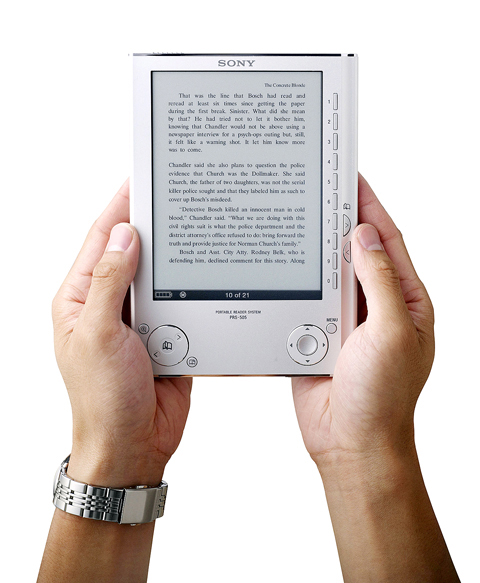Electronic books are often mentioned in the same breath as Amazon.com Inc’s Kindle digital reader. Now e-book rival Sony Corp is determined to recapture consumers’ attention with a smaller reader that’s also US$100 cheaper.
Sony was expected to announce yesterday that it would release the Reader Pocket Edition by the end of this month. It will retail for US$199, a third off the price of the basic Kindle model and about US$80 less than Sony’s PRS-505 reader, which will be discontinued.
The device is entering a small but growing market. US e-book sales totaled US$113 million last year — up 68 percent from 2007 but still a fraction of the estimated US$24.3 billion spent on all books, the Association of American Publishers said.

PHOTO: REUTERS
Steve Haber, president of Sony’s digital reading business division, expects the Pocket Edition’s price tag will lure new consumers who haven’t wanted to shell out for such a device thus far.
Sarah Rotman Epps, a media analyst at Forrester Research, said the Pocket Edition’s price below US$200 breaks an important psychological barrier.
“This is something that is affordable for the holiday season, and I think that you’ll see sales of e-readers outpacing current forecasts,” she said.
She forecast sales of 2 million digital reading devices this year, compared with a little more than 1 million sold by the end of last year.
She doesn’t expect Amazon to rest on its laurels, adding that the online retailer will have to respond to counter Sony’s new price point.
A big difference between Sony’s Readers and Amazon’s Kindle has always been the lack of wireless access for quick and simple downloads of books. The new models are no different: They have to be connected to a computer to acquire books.
For the first time, they will be compatible with PCs and Mac computers, though. Sony will offer current Reader owners a software update to make theirs compatible with both.
As he has indicated in the past, Haber said Sony is working on a wireless model, though he wouldn’t say when.
Sony is also adjusting prices to some of the e-books it sells through its online eBook Store. New releases and best-sellers will now sell for US$10, US$2 less than current prices. Amazon’s Kindle Store offers most best-sellers and new releases for US$10.
Sony’s eBook Store includes more than 100,000 books, as well as a million free public-domain books available from Google Inc through its Google Books project. The Kindle Store has more than 330,000 available titles.
The Kindle can only download books from Amazon’s store, while Sony’s Readers can display texts sold in the “epub” format — an open standard supported by the International Digital Publishing Forum that numerous publishers use to make e-books.

LIMITS: While China increases military pressure on Taiwan and expands its use of cognitive warfare, it is unwilling to target tech supply chains, the report said US and Taiwan military officials have warned that the Chinese People’s Liberation Army (PLA) could implement a blockade within “a matter of hours” and need only “minimal conversion time” prior to an attack on Taiwan, a report released on Tuesday by the US Senate’s China Economic and Security Review Commission said. “While there is no indication that China is planning an imminent attack, the United States and its allies and partners can no longer assume that a Taiwan contingency is a distant possibility for which they would have ample time to prepare,” it said. The commission made the comments in its annual

DETERMINATION: Beijing’s actions toward Tokyo have drawn international attention, but would likely bolster regional coordination and defense networks, the report said Japanese Prime Minister Sanae Takaichi’s administration is likely to prioritize security reforms and deterrence in the face of recent “hybrid” threats from China, the National Security Bureau (NSB) said. The bureau made the assessment in a written report to the Legislative Yuan ahead of an oral report and questions-and-answers session at the legislature’s Foreign Affairs and National Defense Committee tomorrow. The key points of Japan’s security reforms would be to reinforce security cooperation with the US, including enhancing defense deployment in the first island chain, pushing forward the integrated command and operations of the Japan Self-Defense Forces and US Forces Japan, as

IN THE NATIONAL INTEREST: Deputy Minister of Foreign Affairs Francois Wu said the strengthening of military facilities would help to maintain security in the Taiwan Strait Japanese Minister of Defense Shinjiro Koizumi, visiting a military base close to Taiwan, said plans to deploy missiles to the post would move forward as tensions smolder between Tokyo and Beijing. “The deployment can help lower the chance of an armed attack on our country,” Koizumi told reporters on Sunday as he wrapped up his first trip to the base on the southern Japanese island of Yonaguni. “The view that it will heighten regional tensions is not accurate.” Former Japanese minister of defense Gen Nakatani in January said that Tokyo wanted to base Type 03 Chu-SAM missiles on Yonaguni, but little progress

NO CHANGES: A Japanese spokesperson said that Tokyo remains consistent and open for dialogue, while Beijing has canceled diplomatic engagements A Japanese official blasted China’s claims that Japanese Prime Minister Sanae Takaichi has altered Japan’s position on a Taiwan crisis as “entirely baseless,” calling for more dialogue to stop ties between Asia’s top economies from spiraling. China vowed to take resolute self-defense against Japan if it “dared to intervene militarily in the Taiwan Strait” in a letter delivered Friday to the UN. “I’m aware of this letter,” said Maki Kobayashi, a senior Japanese government spokeswoman. “The claim our country has altered its position is entirely baseless,” she said on the sidelines of the G20 summit in Johannesburg on Saturday. The Chinese Ministry